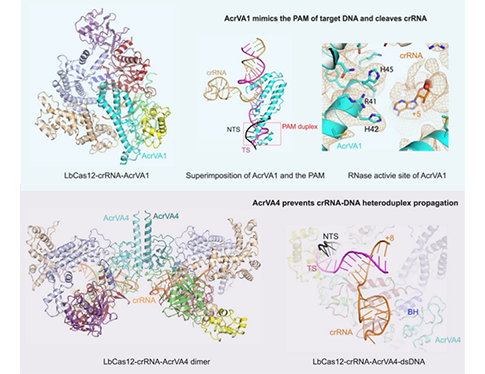Dr. Leifu Chang's Group published in Cell Host & Microbe
06-19-2019

CRISPR-Cas systems are widely known for their applications in genome editing and their role in bacterial immunity against mobile genetic elements (MGEs) such as bacteriophages. However, in response to CRISPR-Cas systems, mobile genetic elements have developed anti-CRISPR (Acr) inhibitors that counteract CRISPR systems, thus creating an arms race between bacteria and MGEs.
Dr. Leifu Chang’s group in the Department of Biological Sciences published an article, available online today in Cell Host & Microbe, that focuses on the structural basis of the inhibition of CRISPR-Cas12a (Cpf1) by Acr proteins. Cas12a has been harnessed as a genome-editing tool alternative to Cas9. Using cryo-electron microscopy, the group determined the structures of Cas12a-crRNA bound to inhibitors AcrVA1 and AcrVA4 at 3.5 and 3.3 Å resolutions, respectively. These structures uncover the molecular inhibition mechanisms utilized by Acr proteins, thus providing insight into the bacteria and MGEs arms race and serving as a foundation for the development of “off-switch” tools for CRISPR-Cas12 techniques in the future.